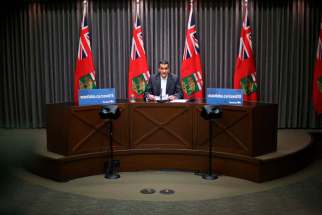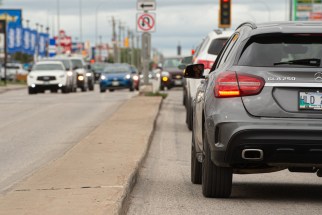MPI customers owed larger rebate, rate cut: consumers group
Read this article for free:
or
Already have an account? Log in here »
To continue reading, please subscribe:
Monthly Digital Subscription
$0 for the first 4 weeks*
- Enjoy unlimited reading on winnipegfreepress.com
- Read the E-Edition, our digital replica newspaper
- Access News Break, our award-winning app
- Play interactive puzzles
*No charge for 4 weeks then price increases to the regular rate of $19.00 plus GST every four weeks. Offer available to new and qualified returning subscribers only. Cancel any time.
Monthly Digital Subscription
$4.75/week*
- Enjoy unlimited reading on winnipegfreepress.com
- Read the E-Edition, our digital replica newspaper
- Access News Break, our award-winning app
- Play interactive puzzles
*Billed as $19 plus GST every four weeks. Cancel any time.
To continue reading, please subscribe:
Add Free Press access to your Brandon Sun subscription for only an additional
$1 for the first 4 weeks*
*Your next subscription payment will increase by $1.00 and you will be charged $16.99 plus GST for four weeks. After four weeks, your payment will increase to $23.99 plus GST every four weeks.
Read unlimited articles for free today:
or
Already have an account? Log in here »
Hey there, time traveller!
This article was published 12/10/2021 (1519 days ago), so information in it may no longer be current.
Manitoba Public Insurance has been accused of charging customers too much and owing them larger discounts and rebates.
The Crown corporation is seeking a 1.2 per cent rate decrease next year and $335 million in rebates for customers. Its rate hearing at the Manitoba Public Utilities Board started Tuesday.
The Consumers’ Association of Canada (Manitoba) says that’s not nearly enough given that MPI is expected to accumulate excess capital totalling $449 million by March 31, 2022, thanks to fewer collisions and claims because fewer drivers are on the road during the pandemic.
Executive director Gloria Desorcy told the Free Press MPI should issue rebates worth approximately $665 per driver because it over-collected insurance premiums.
Instead, MPI wants to transfer some of that surplus to another part of the company to cover driver and vehicle licensing costs which are usually the provincial government’s responsibility, reducing the average rebate to $496 per person, Desorcy said.
In its current application to the PUB, the insurer removed the capital release provision, which had translated into a five per cent discount, as part of the overall rate. Last year, MPI provided customers with a five per cent discount. This year it is only offering a 1.2 per cent discount and a rebate, she said.
In order to return surplus capital to Manitobans sooner, MPI said it applied to the PUB to issue a $335-million rebate. If approved, it will be the second-largest rebate in MPI history with the largest — $336 million — given out in 2011, MPI said Tuesday in a news release.
Since the start of the pandemic, $179 million in COVID-19 rebates have been issued.
The Consumers Association of Canada last week called out MPI for transferring $60 million in excess revenue in March to administer driver and vehicle licensing, and its plan to funnel another $53 million there in March 2022.
“Pre-collected insurance payments from consumers should go back to consumers,” Desorcy argued in an interview Tuesday.
MPI on Tuesday defended transferring the excess capital, saying it is in full compliance with all applicable statutes and regulations.
Desorcy said MPI’s capital management plan, which was approved by the PUB in 2019, called for excess capital to be transferred in an “extremely transparent” way, and that the transfer of excess revenue from extension to basic in order to be rebated would be mandatory and automatic.
Then, in its 2020 application, MPI said it has “discretion to use profits for other purposes than a transfer to basic prior to the end of a fiscal year,” which is what it did when it transferred $60 million earlier this year and what it plans to do again in March, the PUB heard.
MPI shouldn’t use money that it over-collected from ratepayers during a pandemic to fund other non-insurance programs, Desorcy said.
The Manitoba government should have made clear to Manitobans that excess capital was being used to pay for driver and vehicle licensing, said NDP Leader Wab Kinew. In question period Tuesday, Kinew asked Premier Kelvin Goertzen to reveal when the government learned about the “scheme.”
Goertzen called Kinew “a nattering knave of negativity,” suggesting he was promoting conspiracy theories, and insisted the plan to transfer excess capital was not a secret but part of MPI’s general rate application hearing.
Kinew told reporters later the provincial government has known about the plan since March but didn’t tell the public about it until after the Free Press reported it Thursday.
“This is where the government’s interference in MPI becomes an issue,” the NDP leader said.
“Not only has government prevented the people of Manitoba from having that extra cash when they need it, the government has not told you about it.”
Both the Progressive Conservative and former NDP government have meddled in the affairs in Crown corporations, Liberal Leader Dougald Lamont said.
“The rules are in place at MPI for a reason — to protect Manitobans from MPI and to protect MPI from government and to make sure MPI is not abusing its power as a monopoly,” Lamont said. “That’s where it becomes incredibly dangerous for politicians to be interfering, whether it’s (Manitoba) Hydro or MPI, they have complete power.”
At MPI’s hearing before the PUB Tuesday, the lawyer for the Consumers’ Association of Canada said COVID-19 has been a “disrupting event” that may have a long-term impact.
Katrine Dilay, with Public Interest Law Centre, asked if MPI is prepared to monitor and adjust to change accordingly, and if MPI knows whether the actuarial expectations on which it bases rates are too conservative.
carol.sanders@freepress.mb.ca

Our newsroom depends on a growing audience of readers to power our journalism. If you are not a paid reader, please consider becoming a subscriber.
Our newsroom depends on its audience of readers to power our journalism. Thank you for your support.












